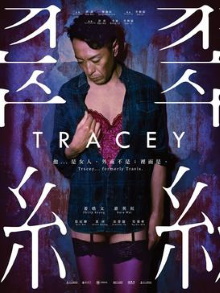
This Hong Kong film made waves for its bold take on transgender issues. It was the debut feature of its director and writer Jun Li and stars multiple well known Hong Kong performers. Unfortunately while I can’t fault its courage I do question its authenticity as it presents a scenario that is just a little too neat to feel quite real.
Travis Tung is a 51-year old married father of two who runs a successful optician’s shop. One day he learns from a phone call that one of his best childhood friends, Gao Zhen. has passed away. When he goes to pick up the remains with his other best friend, they are shocked to learn that the deceased’s closest relative is a younger man, Peng, who their friend had just married not long ago. Moreover Peng reveals that Gao Zhen had always liked Travis and suspects that Travis liked him as well. This opens a can of worms and leads to all kinds of revelations, the most important of which is that Travis has always felt to be a woman trapped in a man’s body and has repressed himself for decades. Meanwhile he also runs into an old mentor of his, a former opera singer who is in the same situation, and his two grown-up children grapples with problems of their own.
There’s no doubt that this is bold, groundbreaking territory for a Chinese-language film and captures the anguish of a person trapped in a body that feels all wrong. Finding ways to link transexual issues with Chinese culture in the form of traditional opera or the gender duality of Buddha is a bit of a predictable move but works well in this context. I also like that it touches on some other aspects of alternative lifestyles such as having the girlfriend of Travis’ son be a tattoo artist who believes that tattooing one’s body is a form of freedom of expression. The closest thing that this film has to a villain character is Travis’ wife played by veteran actress Kara Hui. She is the conservative voice of the film who wants everything to remain the same and not to change, even if that requires keeping quiet and hiding the truth. Even so the film treats her character with remarkable kindness and she does have a point in that Travis leaving to pursue his dream of being a woman disrupts all of their lives.
Yet as well intentioned as this film is, a number of factors keep it from being truly great. The plot relies on a series of coincidences that ultimately result in Travis outing himself. The film is awfully on the nose about waving the flag of transexualism and there’s not much room for subtlety at all. But what makes me most uncomfortable is that it takes the expected route of having Travis and Peng being attracted to each other. This not only seems disrespectful to the memory of the friend they have in common but also makes no sense as Peng is presumably homosexual and presumably is attracted to other men only. He could be bisexual but the film makes no mention of that. For more than anything else, the relationship between the two feels like pity sex and that’s not a good place for this film to go to.
That said, the director is young, shocking so, and no doubt is very much in tune with the LGBT scene in Hong Kong. Perhaps with time his filmmaking skills might improve and his work will take on a more nuanced tone.